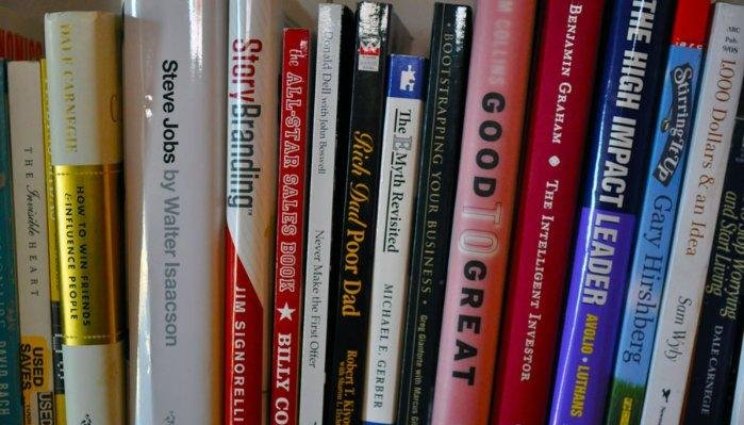This article was originally published on LinkedIn.
One of my favorite professors started each class period by sharing a life lesson. Throughout the semester he regularly encouraged his students to commit to a life of learning. On the last day of class he shared the following: “If you leave here with only one thing from this class, I hope you’ll leave having committed to a consistent reading program.” Since leaving his class, I’ve tried to follow this advice.
There are many great business books, but for this post I’ve focused the list on my six favorite books that are particularly insightful for college students, interns, and young professionals. These books will help you develop critical skills and enhance your professional success.
1. Never Eat Alone by Keith Ferrazzi
Never Eat Alone is the most practical book I’ve read on developing professional relationships and should be required reading for anyone launching a career in business. Here are my three favorite lessons.
Build your network before you need it. The best networking isn’t networking at all. Your goal should be to build relationships. Those connections are what’s going to make a real difference in your life and career.
Don’t Keep Score. Truly connecting with others is a constant process of giving and receiving—of asking for and offering help. You’ve got to be willing to be generous, and accept the generosity of others, without keeping tally.
Be Audacious. Nothing will create more opportunity in life than a willingness to step up and ask for what you need. It’s that simple. Push beyond what you think is “allowed” and you’ll often find that people are eager to help.
2. The Start-up of You by Reid Hoffman and Ben Casnocha
The Start-up of You teaches that you must act as the CEO of your career and take control of your professional future if you want to become globally competitive. To develop a competitive advantage it’s critical to understand your assets (what you’re good at), you’re aspirations (what you want to do), and the market realities (what people will pay you for).
Having only one or two of these isn’t enough. You need all three to develop a true competitive advantage. I’ve often heard speakers say, “Find a job you love, and you’ll never work a day in your life.” This may be true for some, but blindly following passion can lead to an unsustainable career. I’ve found Hoffman and Casnocha’s framework more practical. Know your assets and aspirations in light of the market realities and pursue a path that maximizes all three.
3. Rookie Smarts by Liz Wiseman
Rookie Smarts effectively teaches how experience can be a curse and why people coming into a new role frequently outperform those with more experience. Derek Pando, one of my former classmates, wrote a great summary for this book. Here are a few of his takeaways.
You have more to offer as a rookie than you think. Often, when you’re early in your career all you can think about is the experience you don’t have and the questions you don’t know the answers to. In reality, being a rookie can be a competitive advantage.
Quick wins are important. If you’re in a situation where you’re in over your head, look for some quick wins to build momentum, something that can be done in a few weeks.
Take small steps and increase the frequency of feedback. Instead of asking your manager how to do something, consult with experts, do your homework and come back with a recommendation. Do this every few days if needed. If you’re checking in for feedback frequently, it’s unlikely you’ll fall flat on your face with a project since you’ve had so much time to implement feedback and iterate.
4. How Will You Measure Your Life? by Clayton Christensen
Originally given as a Harvard Business School commencement address and later expanded into a book, Clayton Christensen’s How Will You Measure Your Life? offers a series of guidelines for finding meaning and happiness in life. It’s a great read for anyone seeking to balance a successful career and a fulfilling life. Here’s my favorite quote:
You can talk all you want about having a clear purpose and strategy for your life, but ultimately this means nothing if you are not investing the resources you have in a way that is consistent with your strategy.”
5. Essentialism by Greg McKeown
We constantly hear others humblebrag about how busy they are and how many things they need to accomplish. Greg McKeown argues that it’s time to focus on doing less while accomplishing more. After reading Essentialism I re-evaluated my priorities and learned to say “no” more often. As McKeown says:
Essentialism is not about how to get more things done; it’s about how to get the right things done…It is about making the wisest possible investment of your time and energy in order to operate at your highest point of contribution by doing only what is essential.”
6. Smartcuts by Shane Snow
In Smartcuts, author Shane Snow disproves the idea that climbing the ladder rung by rung is required if you want to reach the top. Instead, he argues that conventions like “paying dues” actually prevent progress, and that lateral thinking (solving problems through an indirect and creative approach) is how the most successful people have always made it.
But, as Snow says, “Lateral thinking doesn’t replace hard work; it eliminates unnecessary cycles.” Smartcuts is a highly engaging book that’s worth reading for anyone seeking to accelerate success in their career.
Like what you read? Click here to subscribe to my monthly newsletter.






